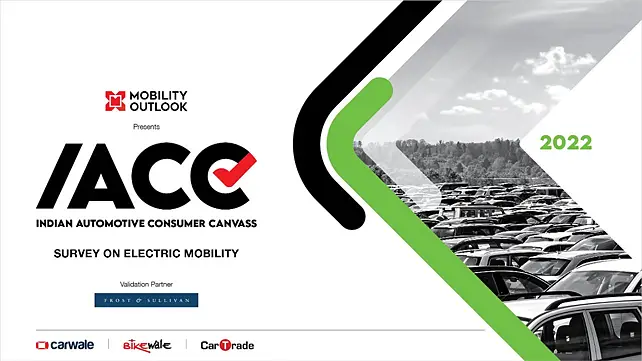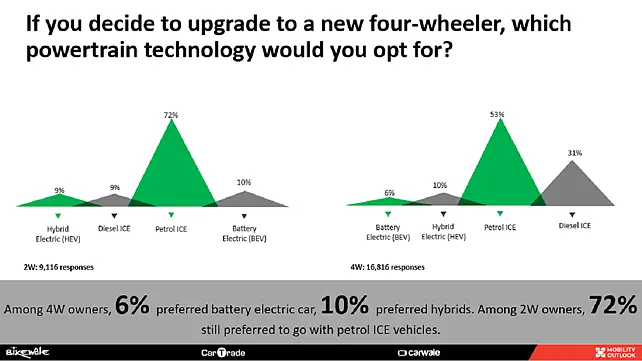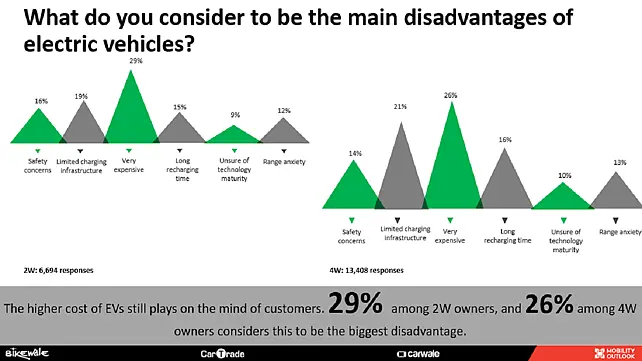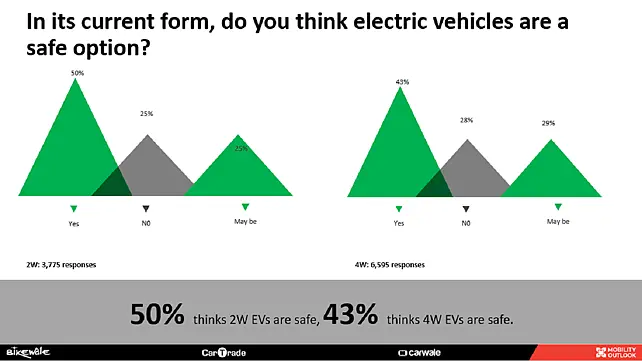
The target of electrifying the majority of vehicles on Indian roads by the year 2030 cannot be achieved without assessing the consumer's mind. Therefore, mobility Outlook, keeping the Indian consumer and electric mobility in context, surveyed how much the end-consumers understand electric vehicles and what they expect from the same. Gathering responses from over 68,000 respondents, the Indian Automotive Consumer Canvass (IACC) survey covered males and females from 18 to 56 years of age groups.
Naveen Munjal, Managing Director, Hero Electric Vehicles, resonating with the survey's findings, noted, '80% of the 2W market will be EV by 2030. The EV sector will witness a 100% CAGR growth in the next three years. In the next five years, the market will increase by 18-20%. EVs will bring new opportunities both in terms of hardware & software.'
Unveiled at the inaugural session of the second edition of the e2W Conference and Exhibition, the report was launched by Munjal, Barnik Chitran Maitra, Managing Partner, India & South Asia, Arthur D. Little and Kaushik Madhavan, Independent Consultant, Frost & Sullivan.

EVs For Daily Commute
The survey's most striking finding was that 83% of two-wheeler users and 69% of four-wheeler users intend to invest in EVs to deploy them for their daily usage. Moreover, 77% of two-wheeler users and 71% of four-wheeler users are aware of the economics of owning an electric vehicle.
Notably, many responses were captured from Metro and Tier-I cities, including Hyderabad, Bangalore, Kolkata, Chennai, Mumbai, and Pune. The maximum number of respondents were from the 18 to 25 and 26 to 35 years of age groups for both two and four-wheelers, respectively. A majority, 37%, of the respondents owned a car, while 36% owned a two-wheeler. Only 2% each owned an electric car and an electric scooter.
Among 4W owners, 6% preferred upgrading to a battery electric car, while 10% preferred upgrading to hybrids. This is a strong message to the OEMs in India, as only a few have introduced hybrids in the country. Among 2W owners, 72% still preferred to go with petrol ICE vehicles, while 10% would prefer investing in an electric two-wheeler. In numbers, India saw sales of 231,338 two-wheeler EVs in FY22, while only 17,802 units of electric passenger vehicles were sold in the same year. On the other hand, ICE counterparts of electric two-wheelers and electric four-wheelers saw sales of 11,973,415 and 2,726,047 units in FY22, respectively.

Lower Running Cost Over Clean Environment
For upgrading to an EV, 38% of respondents in the two-wheeler segment and 35% of respondents in the four-wheeler segment will mainly be encouraged by the advantage of lower running costs, followed by the advantage of low maintenance costs. However, only 20% of four-wheeler category respondents are encouraged by EVs because they are cleaner for the environment. Similarly, only 16% of two-wheeler category respondents are encouraged by EVs because they are cleaner and safer for the environment.
EVs being 'very expensive' came out to be the main disadvantage of owning an electric two-wheeler for 29% of the two-wheeler respondents and 26% of the four-wheeler respondents. Limited charging infrastructure, safety concerns, and long recharging time are also perceived as disadvantages in the minds of consumers. In addition, OEMs will also have to answer the range anxiety question to help consumers adopt more EVs.
Only 50% think e2Ws are safe, while the number is lower in the e4Ws as only 43% think they are safe. Moreover, 25% are unsure whether e2Ws are safe, and the remaining 25% are sure that e2Ws are not safe. Similarly, 29% are not sure whether electric 4Ws are safe, and the remaining 28% are sure that e4Ws are not safe.
A majority of 45% among 2W respondents and 46% among 4W respondents have formed an opinion about EVs' safety based on media reports. Only 16% among 2W respondents and 13% among 4W respondents have personally seen an EV catching fire. On the other hand, friends of 18% among 2W respondents and 16% among 4W respondents have had a bad experience with EVs.

Buying An EV?
Almost a third of respondents – 33% among 2W respondents and 32% among 4W respondents are considering purchasing an EV in the next one year. One-fifth of respondents (20%) among 2W respondents, and 14% among 4W respondents, are certain that they will buy an EV in the next year. However, 36% among 2W respondents and 39% among 4W respondents will invest in an EV if the same can be fully charged in an hour.
Only 17% among 2W respondents and 17% among 4W respondents will invest in an EV if the same can be fully charged in two hours. Additionally, 34% of respondents expect a range of at least 400 km on a fully-charged battery. Home charging came out to be the preferred choice among 42% for the two-wheeler category, while 40% said they would prefer home charging for their 4W Evs.
The good news for the environment and the OEMs is the fact that 62% of 2W respondents and 55% of 4W respondents believed that EVs could replace regular vehicles in terms of satisfying consumer needs. About 30% are willing to stretch their budget by INR 50,000-100,000 for buying e2Ws over petrol, whereas 21% are willing to stretch their budget by INR 50,000-100,000 for buying e4Ws over petrol/diesel. At the same time, 17% among 2W respondents and 20% among 4W respondents are sure that EVs cannot satisfy consumer needs.